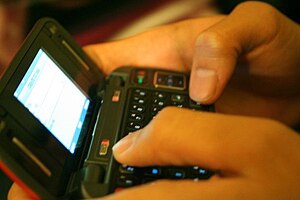If you sleep with your cell phone on the table next to your bed, you may find yourself amongst a growing number of sleep texters – the latest behavioral problem brought on by the electronic age. This disorder, which is a form of somnambulism and is similar to sleepwalking, appears to be on the rise. The relative newness of the condition means there isn’t a wealth of research to review that would aid in understanding why some people are sleep texting and others are not or how to help those who are having this problem.
Dr David Cunnington, a sleep specialist at the Melbourne Sleep Disorder Center, explained that patients who are suffering from sleep deprivation may perform familiar motor functions without waking up. If your cell is next to the bed and it beeps or buzzes to announce the arrival of something new, you might pick it up, type, and hit send without ever waking up. Although most messages are nonsense, some are coherent messages, which can cause problems depending on the content of the message.
There was research conducted in 2008 at the University of Ohio into a similar behavior called sleep emailing. During that study, one participant got out of bed, turned on the computer, opened her email, and sent three emails before returning to bed. She accomplished all this without ever waking up. These findings show the type of complex tasks that can be carried out while experiencing a sleep walking type event.
For many sleep texters, there is no real negative impact to this behavior. They might even have a good laugh with their friends the next day as they look at the nonsensical text sent the night before. But for some, this disorder can be devastating. If your sleeping mind composes an inappropriate email to your boss or a coworker, it could have ramifications on your career. If you inadvertently send something to your mother while dreaming about your husband, Sunday dinner might be awkward for awhile. But these circumstances, while unfortunate, are not the reason everyone should be concerned about the development of these new disorders. The real reason for concern is looking ahead to what other behaviors might follow emailing and texting.
Without research, doctors can only guess at why people are beginning to text in their sleep. Some believe it is a direct result of the increasing connectedness of our young people. Teens who are never without their phone may have these behavior patterns so ingrained that they respond without thinking, whether they are at the dinner table or off in dreamland.
The number of people who are transitioning away from land lines may also be a contributing factor. As you relinquish your old wired phone, it becomes more important to have your cell phone next to the bed and easily accessible.
Future research may look for correlations between the number of texts sent during the day and the prevalence of sleep texting at night or to see if sleep texting is responsible for decreases in sleep duration or quality. Until that research is completed, the best way to avoid becoming a statistic is to leave your phone outside of arm’s reach. Hopefully if you are required to physically get out of bed, the likelihood that you will text while sleeping will be minimized.


